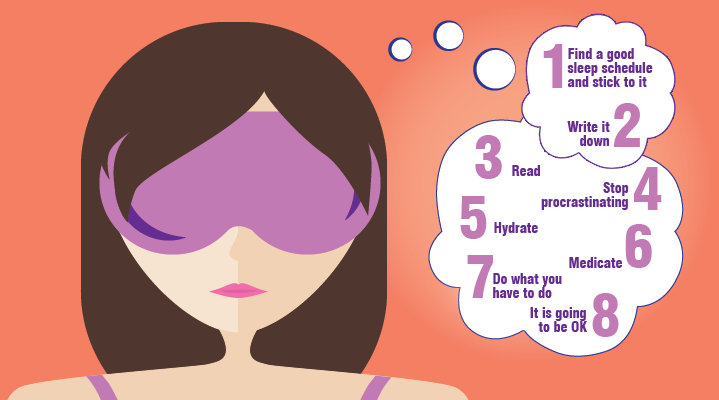Cortisol collapse: tips on how to get a better night’s sleep
November 17, 2015
Not everyone is an insomniac, but you do not need to be one to feel the effects of stress on your ability to have a good night’s sleep. Remaining homework hanging over your head, restless thoughts about the week ahead, struggles with your relationships at school; there are many possibilities of why you are not getting the sleep you need.
Cortisol is known as the “stress hormone”, so if your brain goes blank thinking about the last time you woke up feeling refreshed, then maybe these changes can help.
Find a good sleep schedule and stick to it
It can definitely be difficult to try to go to bed at the same time every night, but getting into a routine will help put your mind at ease because you are no longer thinking about the sleep you are not getting.
Write it down
It might sound silly to keep a journal, but writing down what is keeping you up at night is proven to let you fall asleep faster. Think how once it is on paper, it is not in your mind.
Read
If you see the minutes continue to tick by 30 minutes after you have gone to bed, try reading. This is a perfect opportunity to get some required reading done, along with letting your mind drift off a little easier as well. Most teenagers will keep their phone or computer right by their bed, if you switch to reading it is taking away the distracting, bright screen and letting you fall asleep faster.
Stop procrastinating
As students, there are always going to be opportunities for us to put off doing our work, but do not give in. If you stick to a homework schedule, you can go to sleep without remaining homework hanging over your head. Avoiding procrastination will help you stay on top of a busy schedule if you have multiple extracurriculars.
Hydrate
Already, odds are you are not getting enough water throughout your day. With additional stress, your body can wear out without proper fuel. Continue to drink water throughout the day and finish a glass before you go to bed. Your body will recognize the extra boost, and so will your sleep.
Medicate
If all else fails, take a dose of Melatonin an hour before you want to fall asleep. Melatonin is a naturally produced hormone in your brain, and by adding to it with a supplement, your sleep cycles could become more regulated, helping you fall asleep faster. Be weary though, side effects can include daytime drowsiness and headaches, so only take what your body can handle. Start with taking a minimal dosage of three mgs. If this does not help, progressively take three more mgs until you find your body’s suitable dosage. Do not exceed 10 mgs. Taking more than 10 mgs could cause a dependency on the medication, further damaging your body’s sleep-wake cycles.
However, before taking Melatonin, be sure to talk to your parents and ask your doctor if you have questions or think something else would be effective.
Do what you have to do
In all honesty, some days the stress will not go away. Understand that you can only do your best so occasionally it is OK to stay awake until your eyes just will not stay open. With that being said, know your limits. If stress is controlling your day and affecting your sleep, you will only be able to fake it for so long. Start making some proactive lifestyle changes and your body will thank you for it.
It is going to be OK
You do not have to be an insomniac or have anxiety for stress to take over, but that does not mean it will not get better. For some, your current stresses are all you can think about, and it is putting your worries on a constant loop. So next time you are staring at the ceiling at 2 a.m, know tomorrow is a new day and there is so much more to live for besides your life at school, you just have to give it a chance to work itself out.
All information was found from MindBodyGreen, Livestrong and National Sleep Foundation.










